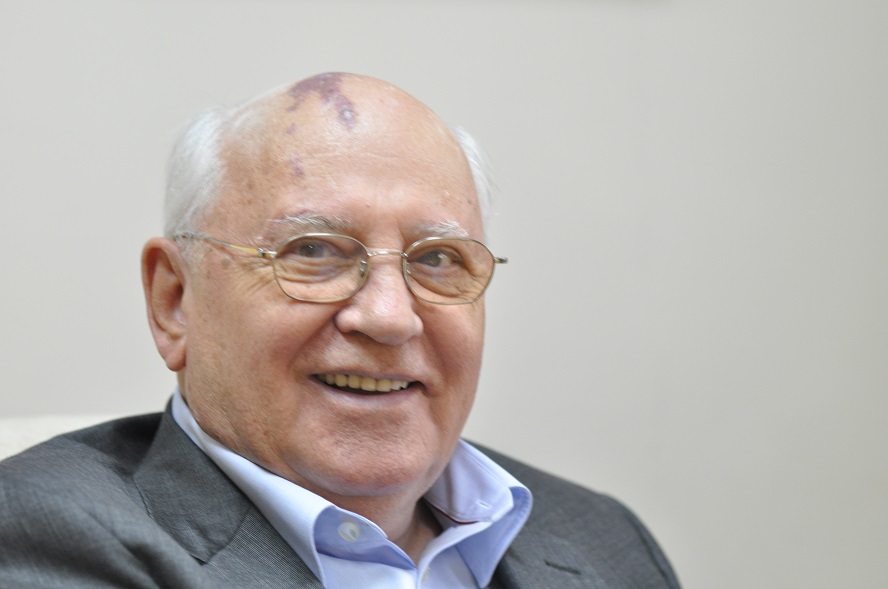That Russia would never be accepted as part of the ‘common European family’ by France, Britain and Germany was never comprehended by Gorbachev.
His repeated forgiving of the efforts of Mahmud Ghori to bring down his kingdom and take away his life ensured that Prithviraj Chauhan was the tragic idealist who initiated the process of destroying the India that had endured for many millennia. He failed to recognise that in Ghori, he faced an opponent who sought nothing less than the destruction of an entire system of governance and its concomitant way of life. Each time Prithviraj spared his life, Ghori went back determined to succeed against the merciful ruler the next time around. Finally, Ghori’s day came with a pre-dawn attack that caught Prithviraj’s army unawares, most being deep in sleep. The Rajput princes of the time fought wars in a manner reminiscent of cricket, with set rules designed to make the contest a battle between chivalric foes. Their error was that as a collective as well as individually, the princes of the day failed to comprehend the systemic, the civilizational nature, of the battle that their foe to the north west was intent on waging. That easy, indeed facilitated and assisted plunder, created in their implacable foe an appetite to control the land and its people. In such a conflict, only a single side wins, and eventually that was not the side of Prithviraj.
In his final moments, as he was facing death at the hands of a foe who had from the start been implacable, the luckless Samrat may have understood the fatal error he had made in sparing the life of a foe with the ambition to transform the land and the people in his own image. Even after more than seven centuries of domination by the Mughals, that did not happen. In villages across India, in minds and in the homes of tens of millions, their belief systems remained intact in a manner that had not been the case in any other country taken over by those who had linked their confidence in victory to their belief and fealty to what they believed to be the message of the Almighty. Later, the Rubicon of cruelty was crossed by Aurangzeb, who as a consequence found himself not the protector of Mughal rule but its destroyer. The Marathas in particular, led by the charismatic military tactician Chhatrapati Shivaji Maharaj, proved to impossible to subdue.
Wars within India opened the doors to conquest by the European powers, with the British establishing dominance over the subcontinent through the use of any means that they judged to be effective for the purpose. The age of chivalric combat had perished with the defeat and execution of Prithviraj, and from then onwards, wars were fought not by another version of the Marquis of Queensbury rules but freestyle. Anything was permitted to subdue the rival. It took the blow to the loyalty towards the British Raj of the Indian armed forces effectuated by Subhas Chandra Bose through the Indian National Army to make Whitehall realise that their time was up in India. Had it been Subhas Bose who had headed the freedom struggle rather than the hand-picked lawyer chosen by Mahatma Gandhi, Jawaharlal Nehru, there may not have been a partition of India in 1947, nor perhaps the peeling away of Sri Lanka, Myanmar and other territories that had earlier been an intrinsic part of the subcontinent. Until Partition, Nehru had been adamant that he would not accept any status for the Muslim community different from that which existed for Hindus, aware of the harm that had been done by the separate electorates and partitions that had earlier been agreed to by the Bose-less Congress leadership.
Only after Partition did Nehru transition to a policy that in many ways sought the separation from the majority of the minorities in India. He instituted a difference in treatment that many regard as a repudiation of secularism while others claim that such an across-the-board separation of the Hindu majority and the rest of the population was on the contrary the essence of secularism. Thus was born Nehruvian secularism, in which rather than accept their common cultural DNA, Muslims and Hindus in particular were subjected to messaging that they were different from each other, an obviously erroneous notion that had been the foundation of M.A. Jinnah’s call to the British to divide the country before exiting it. This past quarter, the rate of growth of the economy has been 13.5%. This is the natural growth rate of the economy, given the abundant qualities of the people of India, although under its initial rulers, the growth rate hovered around 2% annually, breaking free of this only when P.V. Narasimha Rao was the Prime Minister. Incidentally, Rao was disliked, indeed despised, by the matriarch since the tragic death of Rajiv Gandhi in 1991, Sonia Gandhi. Any individual who had the effrontery to argue that she should work to help Rao in his reforms rather than weaken him became an instant object of irritation and worse in her. Ultimately, the fissures in the Congress Party that resulted in the weakening of Narasimha Rao ensured the rise of the BJP. Understandably, A.B. Vajpayee had a soft corner for Sonia Gandhi throughout his six years in the PMH, the Prime Minister’s House.
Returning to Gorbachev, from the start of his ascent to the General Secretaryship of the Communist Party of the Soviet Union, he refused to accept the existential nature of the USSR-US battle that was waged during Cold War 1.0. This was much the way President Biden and some of the other leaders of the Atlantic Alliance have failed to understand the existential nature of the challenge being thrown by the CCP to the US-led alliance, a challenge most visible in the era of the supremacy of Xi Jinping over the CCP. When faced with the economic crisis

